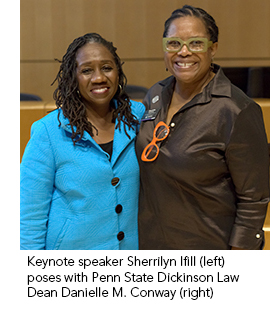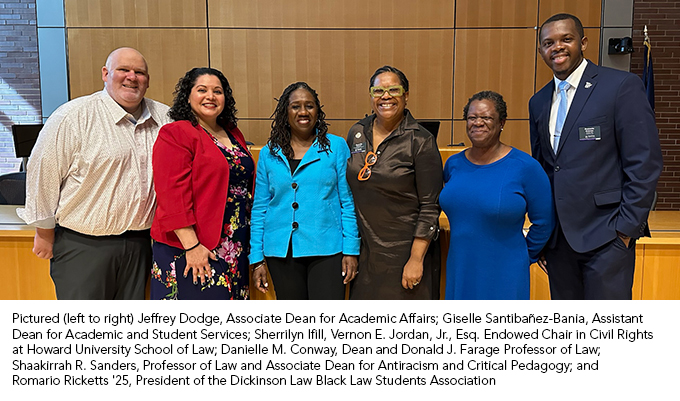CIVIL RIGHTS LAWYER SHERRILYN IFILL’S KEYNOTE HIGHLIGHTS ANTIRACIST DEVELOPMENT INSTITUTE’S “ENERGIZING” INAUGURAL CONVENING AT DICKINSON LAW
October 2023 — A few minutes into her keynote speech at the Antiracist Development Institute’s Inaugural Convening at Penn State Dickinson Law, former president and director-counsel of the NAACP Legal Defense and Educational Fund Sherrilyn Ifill spoke directly to the 1L students in the audience.
She commended them for committing to leadership in a time of uncertainty, imparting some of the wisdom that has made her one of the nation’s most accomplished civil rights lawyers, most sought-after legal commentators, and most popular (and pithiest) scholars on social media.
 “You decided, despite everything that is happening around us, to come to law school, and that means you have decided that you are going to be a leader because that is what lawyers are, whether they want it or not. And whether they deserve it or not,” said Ifill. “Lawyers, not just in this country, but around the world, are the people who are consulted to think through how we build governments.”
“You decided, despite everything that is happening around us, to come to law school, and that means you have decided that you are going to be a leader because that is what lawyers are, whether they want it or not. And whether they deserve it or not,” said Ifill. “Lawyers, not just in this country, but around the world, are the people who are consulted to think through how we build governments.”
Her speech was one of many high points during the October 12-14 Convening, titled “Building an Antiracist Law School, Legal Academy, and Legal Profession.” The event — which included sessions on admissions, teaching and learning, and leadership — took deep dives into systems design and design thinking, while creating space and ample time for networking by students, staff, faculty, administrators, community members, book series chapter contributors, lawyers, documentary film makers, publishers, and more.
“The rule of law belongs to all of us. The Inaugural Convening demonstrated this point,” said Dickinson Law Dean and Donald J. Farage Professor of Law Danielle M. Conway. “People who were not lawyers engaged in discussions about institutional antiracism alongside lawyers, while it showed that lawyers, too, are engaged in teaching and learning. People felt like they belonged. That meant so much because we as a law school very intentionally created an environment in which we make the rule of law and institutional antiracism accessible to everyone.”
The event drew 93 people from as far away as San Antonio, Texas and Baton Rouge, Louisiana. “We are so fortunate to be working alongside such a dedicated and committed coalition of legal academicians and professionals on the ‘Building an Antiracist Law School, Legal Academy, and Legal Profession’ book series with the Antiracist Development Institute, some of whom were a part of our Convening as well,” said TaWanda Hunter Stallworth, program manager for the Antiracist Development Institute.
The Power and Promise of the Fourteenth Amendment
In her speech, Ifill noted that students and others committed to the ADI’s principles have an opportunity to be founders and framers, at a time, she said, when “much of the former infrastructure is unraveling.” That led into a deeper examination of the Fourteenth Amendment, which the Senate passed in 1866 and was ratified in 1868.
The amendment grants citizenship to everyone “born or naturalized in the United States,” including formerly enslaved people, and provides all citizens with “equal protection under the laws.”
“The words ‘equality’ and ‘equal protection’ take us all the way back to the Declaration of Independence: ‘We hold these truths to be self-evident that all men are created equal.’ That is not in our Constitution, that is in the Declaration of Independence,” said Ifill. “These concepts are years in the making, and they are made not just by legislators; they are made by people fighting in their own communities for recognition.”
Looking around the Apfelbaum Family Courtroom and Auditorium filled with people from diverse ethnic and racial backgrounds, Ifill said, “In creating this provision that was meant for Black people, they created this room. … When you think about framing and founding, you create something that is meant for a group of people. The collateral consequence of it, particularly when it is created for people who are marginalized, usually redounds to the benefit of the larger population.”

After her speech, Ifill remained onstage to field questions from Dickinson Law Assistant Dean for Academic and Student Services Giselle Santibañez-Bania and Romario Ricketts ’25, president of the Dickinson Law Black Law Students Association. Then, Ifill conversed with students from the Race and Equal Protection of the Laws course.
A meet-and-greet opportunity followed, where students (and several ADI Convening attendees) lined up to take pictures with Ifill, who has almost half a million social media followers.
“Professor Ifill has been the leading voice on civil rights issues for the last 20 years or so. It was great to hear from a woman with such a wealth of real-world experience,” said Ricketts. “I was really struck by her thoughts on the Fourteenth Amendment and that it is our duty, as young people, to take on this fight and really fashion this America, this democracy, into what we want it to be.”
“Professor Ifill’s speech was very powerful,” said Shawna Traver ’26, who is taking Race and Equal Protection of the Laws. “One of the things we have talked about in class is working with people who have differing opinions from you. She talked about lawyers finding commonality and a shared goal. I really liked this idea that even if you disagree with people, you need to find a way to move forward with them.”
“Resolute in the Work We Have Done”
Dickinson Law created the ADI in 2021 to dismantle structures that scaffold systemic racial inequality using a systems design approach. It was a direct response to the murder of George Floyd and other Black and Brown people in 2020, which demonstrated the prevalence of systemic, structural, and institutional racism.
As part of that focus on antiracism, Dickinson Law also introduced Race and Equal Protection of the Laws, a mandatory course for 1Ls that centers on the Fourteenth Amendment. “Our approach has been legitimized with Professor Ifill’s conversation,” said Dean Conway. “It made me resolute in the work we have done. We have kept the fire of the Fourteenth Amendment burning through our course.”
Students agree. “We are addressing real issues and things that are actually affecting us day to day, specifically surrounding race,” said Divya Patel ’26. “Dickinson Law and the ADI are taking a step forward to make sure we are going in the right direction.”
Trent Hargrove ’80 said that when he graduated from Dickinson Law, “I was one of two Black men in the whole school. I am very fond of Dickinson Law. But it was not within anyone’s imagination then that we would now have an African American woman dean who would create an antiracism institute.”
Hargrove, now the diversity, equity, and inclusion officer for the Pennsylvania Bar Association, hoped to get ideas for educational programming from the ADI Convening. “I have come away with a lot of research that will allow me to develop training programs for lawyers in the context of bias within the profession,” said Hargrove. “It has been a rich experience to gain information that I can now use to talk about lawyer professionalism in the 21st century.”
“Here in the heart of South Central Pennsylvania, we are making incremental and intentional steps that are inspiring others to join us in our work toward the elimination of racism and white supremacy inside and outside of the legal profession,” Stallworth said.
Support for Ongoing ADI Efforts
Conway acknowledged the support of ADI sponsors AccessLex, Law School Admission Council, the John D. & Catherine T. MacArthur Foundation, the National Association for Law Placement, University of California Press, Penn State University, and Emily and G. Griffith “Griff” Lindsay ’79.
During Thursday’s ADI Convening Banquet, Griff Lindsay received the Antiracist Alumni Award for demonstrating a significant commitment to antiracism. Jay Austin received the Disruptive Collaborator Award, for encouraging community members to work outside their comfort zones, and Evangeline Mitchell earned the Changemaker Award, presented to someone who has offered access or information to diversify and create an antiracist legal profession.
The Student Intern Awards went to Elsie Furhman ’25 and Joshua Hanson ’25 for supporting the ADI as student interns.
Moving Forward with Energy
The Inaugural Convening was a success by any measure. In addition to engaging students and attendees, it prompted new contributors to sign up to write book chapters. Another 18 system designers were onboarded during the event. And everyone who attended felt a sense of belonging.
“We were so intentional in our planning. We wanted each person to walk away with their cups overflowing,” said Stallworth. “From the reports of those who attended, I think we achieved that intent in our Inaugural Convening, and I am already looking forward to what the future iterations will bring.”
“I participated in the leadership group, and it was a wonderful experience,” said Roger L. Worthington, professor and executive director of the Center for Diversity and Inclusion in Higher Education at the University of Maryland. “I had many fantastic conversations, including speaking to some of the folks contributing to the book series.”
“The ADI Convening was so energizing,” said Dean Conway. “Not everyone there was steeped in institutional antiracism, critical pedagogy, or systems design, but everyone wanted to lean in and stay in conversations that discussed those things. I had people saying to me, ‘Can I move to Carlisle?’ They did not want to leave.”
Conway received an email after the event from an attendee, Jim Griffith, who is not an attorney. Griffith, who described himself as a longtime Carlisle community volunteer, called the event’s impact “revolutionary.”
“The legal profession has played a central role in establishing racist institutions and laws ever since colonial times. Consequently, the profession has an ethical responsibility to undo centuries of such damage and to work to implement laws and policies that are fundamentally antiracist,” wrote Griffith. “On hearing that explanation, I found myself both motivated and inspired to dedicate my own energies and efforts to supporting the realization of such a worthy and significant objective. It is at its core a way to work toward leaving the world a better place than it was found.”
Indeed, it is just as Conway said: “The rule of law belongs to us all.”